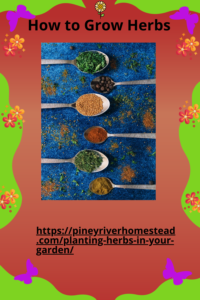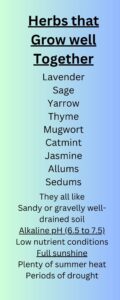Herbs are a type of plant that adds flavor and aroma to food, as well as providing numerous health benefits. Planting herbs in your garden is an easy way to enjoy their many advantages, and can also be quite rewarding! In this article, we’ll explore the types of herbs to consider planting, how to prepare your garden bed, planting and caring for herbs, harvesting and storing them, and conclude with why planting herbs in your garden is fun and rewarding.
Types of Herbs to Consider Planting
When deciding which herbs to plant in your garden, it’s important to consider the purpose of each type. For example, culinary herbs are used to add flavor and aroma to cuisine, while medicinal herbs contain healing properties that can be used in natural remedies. There are also ornamental herbs which are simply grown for their aesthetic value. Popular culinary herbs include basil, rosemary, thyme, oregano, sage, and parsley; common medicinal herbs include dandelion root, chamomile flower, ginger root, and peppermint; and popular ornamental herbs include lavender, German chamomile, yarrow, and fennel. Many of these herbs can be used for all of these: flavoring food, beautifying your yard and making home remedies!
Preparing Your Garden Bed
Before planting your herbs, it’s important to prepare the soil. Ideally you should use a blend of compost or organic matter such as manure to improve drainage and increase nutrients. If possible, it is best to till the soil 6-8 inches deep for optimal root growth. Additionally, it is important to test the pH level of your soil and adjust if necessary by adding sulfur or lime depending on the desired acidity.
Planting & Caring For Herbs
When planting herbs in your garden, be sure to give them plenty of room to grow. Most herbs require full sun and well-drained soil, so it’s best to site them in a sunny area or use containers if necessary. Be sure to water your herbs regularly, but take care not to overwater as this can lead to root rot. Additionally, fertilize your herbs with a balanced fertilizer once every few weeks for optimal growth.
Finally, be sure to trim your herbs regularly to keep them from becoming leggy and unruly. Many herbs can be harvested by a cut and come again method. Just don’t take more than one third of the plant.
Harvesting & Preserving Herbs
When harvesting herbs for cooking or home remedies, it is best to pick them in the morning after the dew has dried but before the hottest part of the day. This will ensure that you get the most flavor and aromatics from your herbs. For best results, use scissors or pruning shears rather than breaking off leaves with your hands.
Once harvested, you can preserve your herbs by drying or freezing them. To dry the herbs, hang bunches of stems upside down in a cool dark place and let them air dry for several weeks before storing in airtight containers. Freezing herbs is also an option, either with or without blanching. Place the herbs in a plastic bag before freezing for longer storage. With proper care, your harvested herbs can last for several months.
Conclusion
Growing and harvesting herbs is not difficult if you take the time to prepare your garden soil and learn about the best ways to plant, care for, and harvest herbs. Adding different herb varieties to your garden can provide a variety of wonderful flavors, aromas, and health benefits. With some patience and care, you can use your homegrown herbs for cooking or home remedies year round!
Other Considerations
When growing herbs in your garden, it’s important to consider the soil pH level as well as other environmental factors, such as sunlight and temperature. Additionally, certain herbs can be more susceptible to pests than others, so you should research the specific varieties you want to plant before getting started. Finally, make sure to practice sustainable growing methods and avoid using chemical pesticides or fertilizers in your garden if possible.
Happy herb gardening!
References:
For additional information on growing and harvesting herbs, check out these resources:
https://www.almanac.com/growing-herbs-garden
https://www.thespruce.com/harvesting-herbs-for-growth-5270569
https://www.motherearthnews.com/organic-gardening/best-medicinal-herbs-for-difficult-growing-conditions-zm0z17amz/


